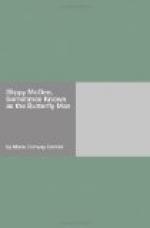“If I might offer a suggestion,” I said in as matter-of-fact a voice as I could command, “it would be, that the sooner those letters are destroyed, the better.”
Mary Virginia took them from me and dropped them on the coals remaining from last night’s fire—the last fire of the season. They did not ignite quickly, though they began to turn brown, and thin spirals of smoke arose from them. The Butterfly Man knelt, thrust a handful of lightwood splinters under the pile, and touched a match here and there. When the resinous wood flared up, the letters blazed with it. They blazed and then they crumbled; they disappeared in bits of charred and black paper that vanished at a touch; they were gone while we watched, the girl kneeling upon the hearthrug with her hand on Flint’s arm, and I with my old heart singing like a skylark in my breast, and my mother’s mild eyes upon us all.
Life and color and beauty flowed back into Mary Virginia’s face and music’s self sang again in her voice. She was like the day itself, reborn out of a dark last night. When the last bit of blackened paper went swirling up the chimney, and the two of them had risen, the most beautiful and expressive eyes under heaven looked up like blue and dewy flowers into the Butterfly Man’s face. She was too wise and too tender to try to thank him in words, and never while they two lived would this be again referred to so much as once by either; but she took his hand, palm upward, gave him one deep long upward glance, and then bent her beautiful head and dropped into the center of his palm a kiss, and closed the fingers gently over it for everlasting keeping and remembrance. The eyes brimmed over then, and two large tears fell upon his hand and washed her kiss in, indelibly.
None of us four had the power of speech left us. Heaven knows what we should have done, if Laurence hadn’t opened the door at that moment and walked in upon us. I don’t think he altogether sensed the tenseness of the situation which his coming relieved, but he went pale at sight of Mary Virginia, and he would have left incontinently if my mother, with a joyous shriek, hadn’t pounced upon him.
“Laurence! Why, Laurence! But we didn’t expect you home until to-morrow night!” said she, kissing him motherly. “My dear, dear boy, how glad I am to see you! What happy wind blew you home to-day, Laurence?”
“Oh, I finished my work ahead of schedule and got away just as soon as I could,” Laurence briefly and modestly explained thus that he had won his case. He edged toward the door, avoiding Mary Virginia’s eyes. He had bowed to her with formal politeness. He wondered at the usually tactful Madame’s open effort to detain him. It was a little too much to expect of him!
“I just ran in to see how you all were,” he tried to be very casual. “See you later, Padre. ’By, p’tite Madame. ’By, Flint.” He bowed again to Mary Virginia, whose color had altogether left her, and who stood there most palpably nervous and distressed.




